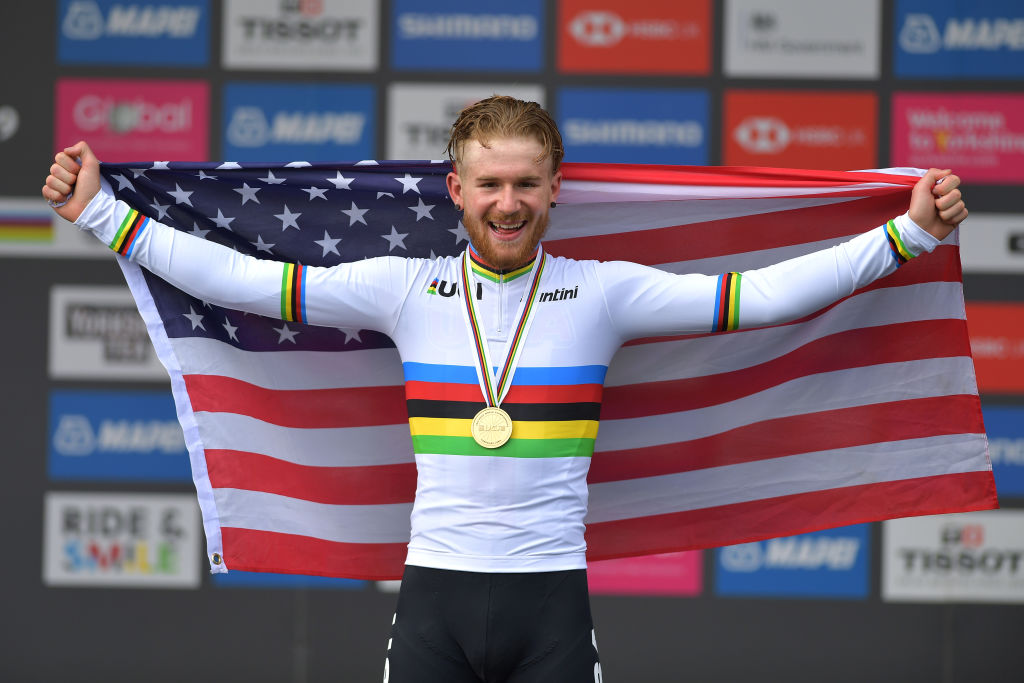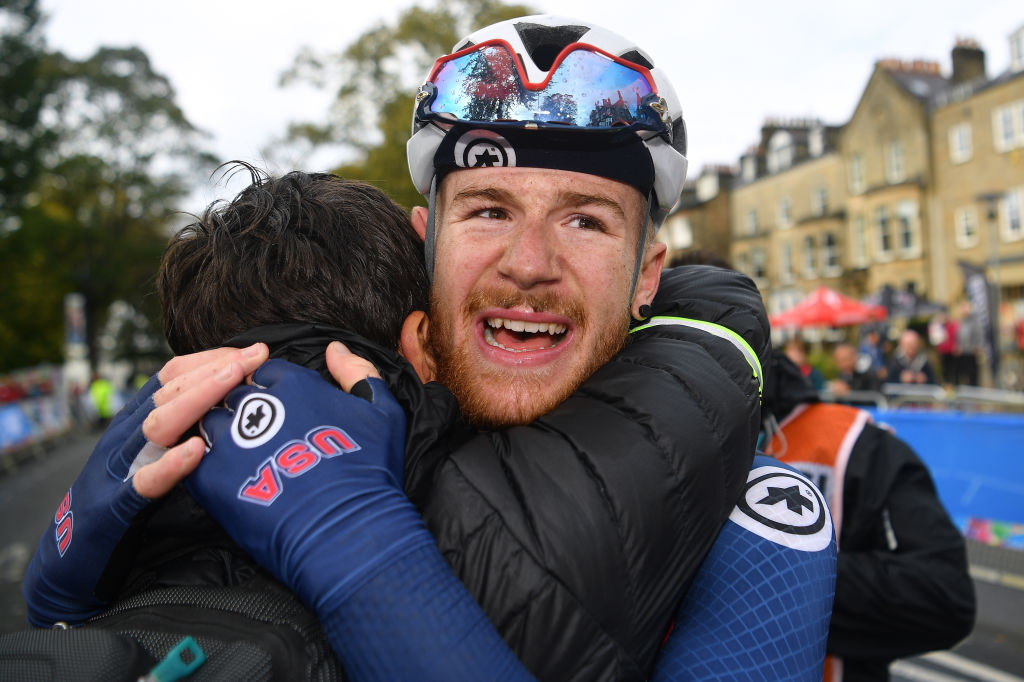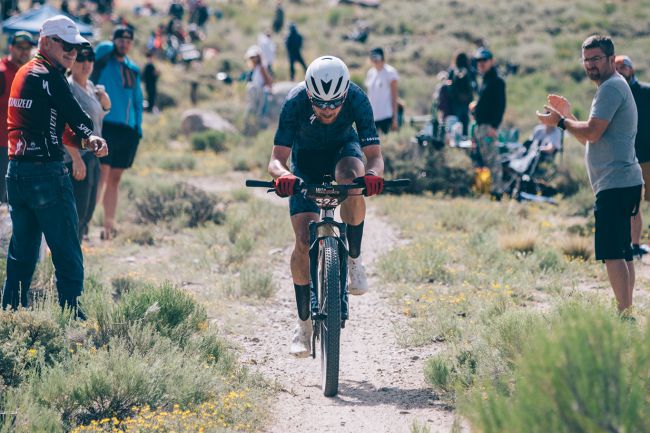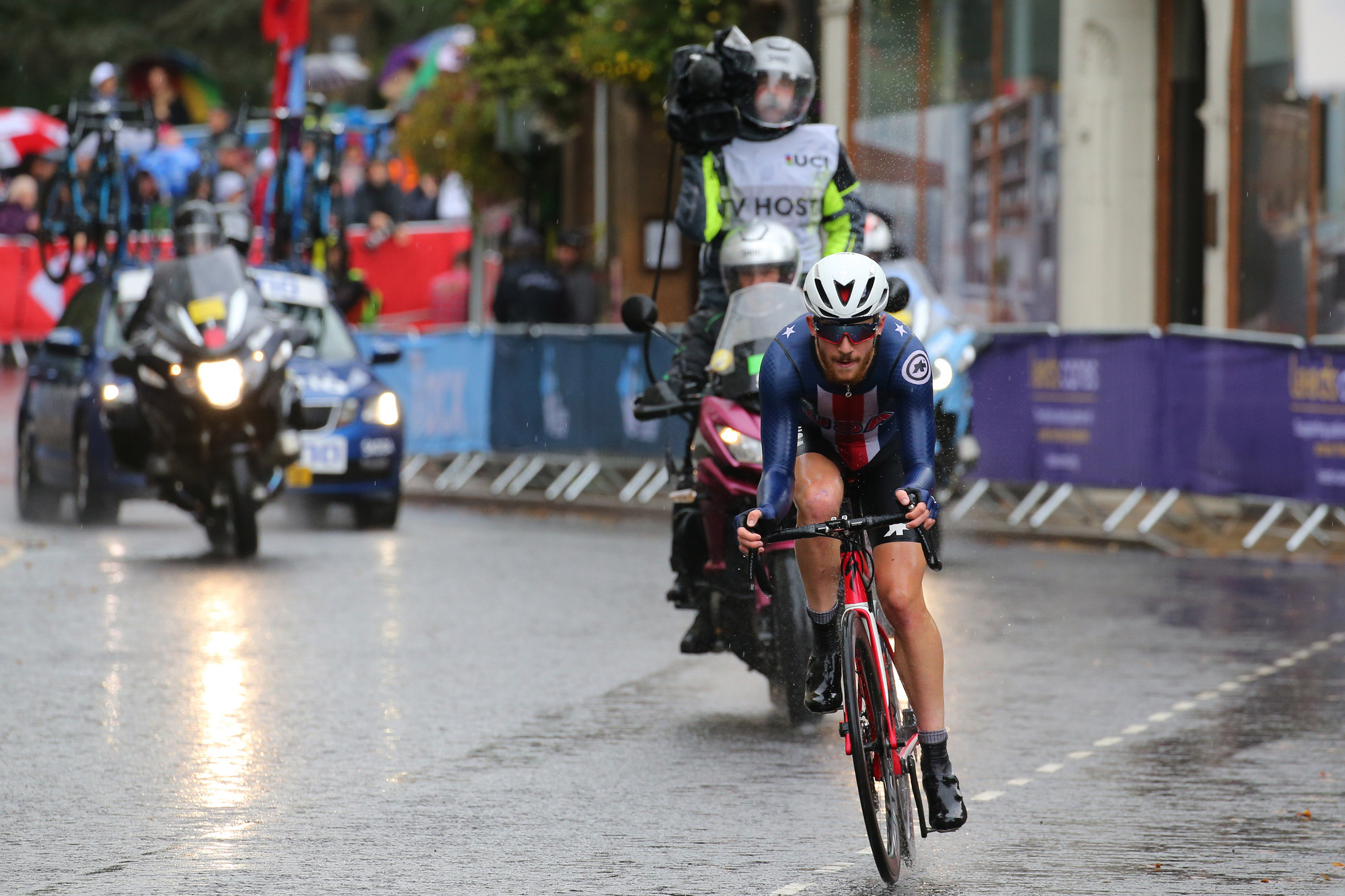The new Evenepoel: Quinn Simmons takes the world by storm
Just 19 months after taking up road racing, 18-year-old American is world champion and heading for the WorldTour

"My goal was to win, but if I were to win, it would be to do it from a long way out, and solo. I think that's the coolest way to win – you have a whole lap, basically, to realise what you've done."
Speaking in the wake of his victory in the junior men's road race at the World Championships, Quinn Simmons was full of great quotes, but that one was probably the most revealing.
Precious few riders have the ability to win a world title. No one gets to choose how they do it, especially not based on what's 'cool'. No one except for Quinn Simmons, that is.
The 18-year-old's 30-kilometre solo raid in Yorkshire was an exhibition, one that will surely be remembered as the first time he announced himself to the world. There were shades of Remco Evenepoel's victory 12 months ago – that feeling he was riding a race all of his own – and the parallels with the precocious Belgian were underlined just a couple of hours later when it was announced he'll be skipping the U23 ranks and heading straight for the WorldTour with Trek-Segafredo.
Simmons, as Roy Knickman, his manager at the LUX Cycling team, tells us, is "something special". His status as world champion defies logic given he raced a road bike for the first time only 19 months ago.
Before that, he was a mountain biker, and only took up road cycling as it "sounded kinda fun" and he figured it might serve as useful training for mountain biking. Before long, however, he was hooked. "Honestly, road racing is just so much more fun than killing yourself for an hour and that's it," he says now.
It also helped that he was good at it – scarily good at it. In his first race, at the Valley of the Sun in February 2018, he won both the time trial and the road race. The next month, in his first race in Europe, he placed third in Gent-Wevelgem. This year he went back and won Gent-Wevelgem, followed by three stage races - Junioren Driedaagse, GP Ruebliland, and Keizer de Juniores – and now the Worlds.
Get The Leadout Newsletter
The latest race content, interviews, features, reviews and expert buying guides, direct to your inbox!
"In two years, from not knowing how to race a road bike, to world champ, is pretty crazy," he says with a chuckle.
The man he singled out in Harrogate for facilitating that journey was Knickman. "I give him pretty much all the credit for my development, because no one else really wanted to take a chance on a mountain bike racer who had no results."
'You could see it from day one'
Speaking to Knickman a little later, we hear how it all began.
"Two years ago, I received an email from a friend of mine, Ned Overend, who is a legend in mountain biking, and he said: 'Hey, I've got this kid from Durango who wants to race on the road. He is something special.'
"My team was full, but I called up Quinn anyway, and you could tell the guy was a student of the sport and that he wanted this more than anything. So I made room on the team.
"The kid showed up at a training camp – we always do a winter camp in Santa Monica during the holidays – and I gave him this five-year-old bike. On the first day, you could already see it. I was like 'holy crap'. He had this power, this bite. It was clear from day one what Ned Overend saw, and what he was built to do. He's a guy who, on rolling terrain… it's just raw power, it's just a 'smash it' kind of guy.
"I brought him to his first road race, which was a national team race, and he was still 16. The first day was a 20km road bike TT, and he wins it close to the time [Brandon] McNulty did when he came to our team. And I'm like 'wow, ok'.
"So then the next day his job is to lead out our sprinter up this long drag. He hits it with 1km to go, there are 20 guys on his wheel, and our sprinter gets dropped. He turns around and just goes 'oh', and then he just lets himself out, hits it, and wins. Those were the indications from the beginning he had something special."

Just a month later, Simmons found himself in Belgium, preparing to race Gent-Wevelgem, the junior version of one of the biggest Classics in the world. American youngsters often talk of a culture shock when they get their first taste of European – and, in particular, Belgian – racing. Most will refer to getting their 'head kicked in'. Simmons finished third.
"I kind of jumped right into the deep end, but I definitely didn't know what I was doing," he says. "Actually, the funny story is the reason I got third was I was too afraid to ride in the bunch, so I attacked and got in the break after 10km. I don't think we were supposed to make it but it was just one of those special days where everything works."
The following month he finished seventh at the junior Paris-Roubaix, and in the summer he won the US junior time trial title. He was still combining road and mountain bike but decided he needed to narrow his focus. "There are more opportunities in road racing – in the US it's hard to make it as a mountain bike racer."
2019 started with a bang, with victory at Gent-Wevelgem, and he would go onto win more than 10 races in Europe, each more emphatically than the last. If anyone needed any warning about Worlds, two weeks earlier he and Magnus Sheffield, who won bronze in Yorkshire, embarked on a near-70km solo raid on the opening day of the Keizer de Juniores, finishing more than a minute clear of everyone else.
The mind of a champion
In hindsight, everything he was doing on the road was pointing to his exhibition in Yorkshire. However, there was a brief return to the fat tyres and suspension that was just as remarkable, and just as revealing.
Simmons lined up at the Leadville 100 mountain bike race last month as an 18-year-old at one of the most gruelling MTB races in the world. Any vague ambitions of success were seemingly crushed when he suffered repeated flats, with five thumbtacks found in his front tyre. After trying to plug the holes and replacing the tube, only for it to puncture again, he found himself more than 10 minutes in arrears when he reached the tech pit. What happened next was extraordinary.
"It just felt like something that shouldn't be happening and I got really frustrated," Simmons told Velonews after the race. "And that's why, when I started going, I was so mad that I figured I would ride as hard as I could until I blew up."
The thing was, despite hitting every climb as if it was the last, he didn't blow up. He only blew right through the field, somehow making it over to a group that contained Lachlan Morton and Peter Stetina. Howard Grotts was away and won solo but Simmons picked off the WorldTour duo in the sprint to take second.

"It was a crazy experience – one of the hardest things I've ever done," he says. "Once you've done that, 30km on a road bike doesn't seem that hard. I had that in the back of my mind [at Worlds] when the legs started cramping on that last lap – knowing you can always give a little bit more."
For Knickman, Leadville was illustrative of a mentality that could take him to the top of the sport.
"Quinn has this ability to tap into emotion, this fierceness, this race intelligence, that few people have," he says.
"I can see the things that drove [Greg] LeMond and made him go deeper and, even though I'd hate to associate his name with Lance [Armstrong], part of Lance – outside the doping and just being a horrible human being – was that he had this ability to tap into his emotions, into his past, and go a little deeper than everyone else.
"It's a tool only certain elite athletes have, one that can also destroy them. I've had to study and figure Quinn out for two years, because it hasn't always been easy. When things don't go well, he'll let you know, because when he's all-in, he expects everyone else to be all-in and things to go right.
"Quinn has never limited himself with 'oh I can't do this'. It's like 'why wouldn't I do this'. Everyone says he can't do something, and it spurs him on. He wants to prove the world wrong."
Going pro
Plenty of people told Simmons he couldn't skip the U23 ranks and go straight to the WorldTour at the age of 19. He'll be out to prove them wrong in the colours of Trek-Segafredo next year.
Remco Evenepoel has skewed our perception of normality this year, but it has to be remembered that, for most people, even the move from final-year U23 to the pro ranks can seem like a leap of faith. Yet, such is Simmons' potential, Cyclingnews understands he had several WorldTour teams circling around him, and ended up with solid options with no fewer than four of them.
His connections at Specialized, through Overend, led him to do testing with Deceuninck-QuickStep and Bora-Hansgrohe. In July, he joined Bora on an altitude training camp in Austria, and impressed. However, the push was mainly coming from Specialized, and there were other teams showing a keener interest.
Simmons had a base in Sittard in the Netherlands for his European racing stints, and was soon in contact with Team Sunweb, a German-registered team with a strong Dutch influence. Again, he was invited to train with WorldTour pros and, again, he impressed. Sunweb manager Iwan Spekenrink confirmed to Cyclingnews he had offered Simmons a spot on their U23 development team for 2020.
"We followed him for a long time, we worked with him, and we would have liked to have him in our development team, but he decided to do something else," Spekenbrink said.
Cyclingnews understands that Sunweb budged slightly, and offered a guarantee of a spot on their WorldTour roster in 2021, but still required that he first spend a year at the development set-up.

In the end, Simmons had two concrete WorldTour offers that he liked the look of – one from Trek-Segafredo, the other from EF Education First. Both were offering very similar proposals, but that was mostly due to the fact that Simmons had gone to the teams himself and laid out his ideal race schedule – another sign of his maturity and willpower.
Simmons' first pro season will effectively be split in two, starting at the Tour Down Under in January before another short stage race in February ahead of the Spring Classics, where he should be parachuted into the biggest races with immediate effect.
In the middle of two predominantly European blocks he will be able to spend more than two months at home in the US, first racing the Tour of California before heading off road for Dirty Kanza and Leadville 100 – events that are becoming increasingly important to Trek. Little wonder, then, that Jonathan Vaughters was keen to add him to EF's band of 'alternative calendar' adventurers.
"JV is my friend, or has been my friend, and he wasn't happy I wasn't able to direct Quinn to his team," Knickman reveals. "All I said was 'hey man, I supported him and he felt more comfortable going to Trek'. And you know what, it's his life. He has to go with what makes sense to him. He is his own man.
"In the end, it wasn't money and it wasn't schedule; it purely came down to feel, and trust, based on the conversations he had with each team."
Simmons will also get opportunities in the Classics, which might have been hard to come by at Bora, and certainly at QuickStep. Trek are losing John Degenkolb, while Jasper Stuyven, Mads Pedersen, and Edward Theuns were all disappointing last spring. "That opportunity excites Quinn," says Knickman. "He doesn't want to hang around."
The rest of the year will see him do smaller, low-key races, and nothing longer than the week-long Tour of California.
"He's going to be fine at WorldTour level with the goals he has. I actually think he's going to have some success. He'll have to get used to not winning so much, but I do think he will surprise people and win a few things – he's that good," says Knickman.
"Going back to what I said earlier, if an opportunity presents itself, and he has good legs, he will be be thinking, 'Well, why can't I win that race, I don't care, I'm not intimidated, I'm just going to do it'."
We saw it in the Valley of the Sun, we saw it in Gent-Wevelgem, we saw it in Leadville, and we just saw it in Yorkshire. Quinn Simmons: a force of nature, coming the way of the WorldTour.
Patrick is a freelance sports writer and editor. He’s an NCTJ-accredited journalist with a bachelor’s degree in modern languages (French and Spanish). Patrick worked full-time at Cyclingnews for eight years between 2015 and 2023, latterly as Deputy Editor.
